Far Away Eyes’ Deeper Look: Supernatural 11.05 “Thin Lizzie”
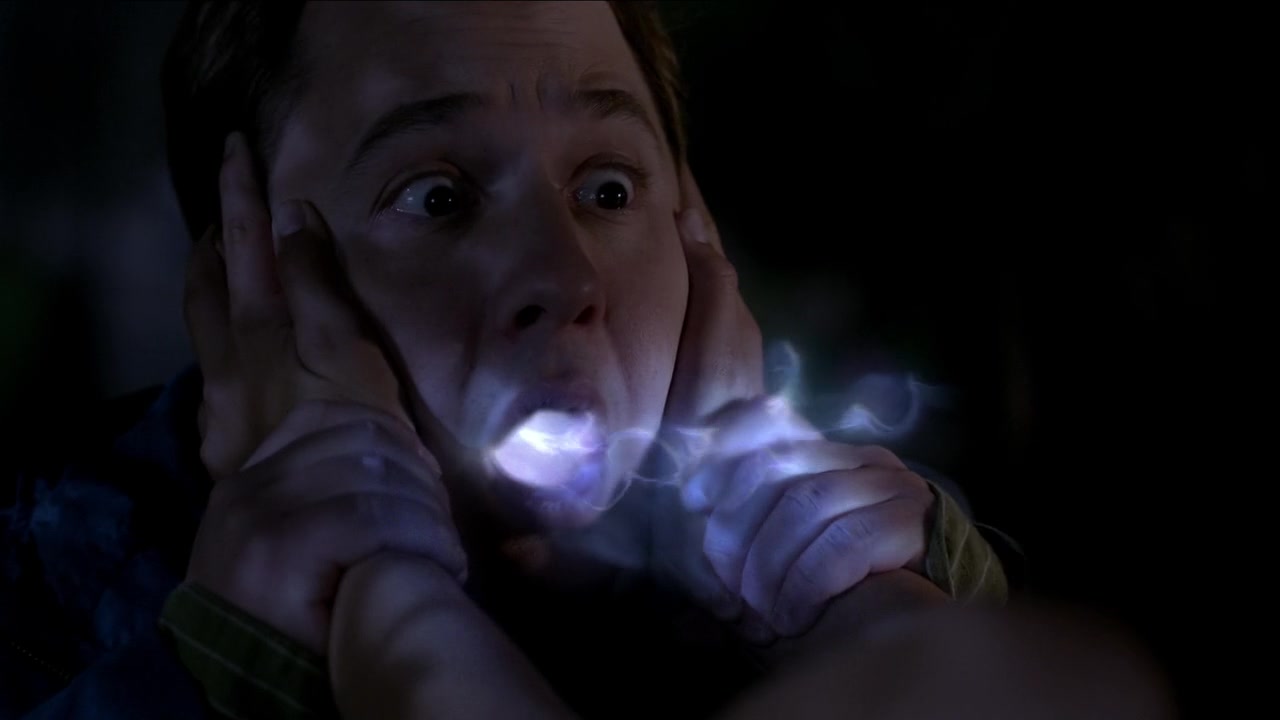
“People react differently to loss.” Within the construct of “Thin Lizzie,” this statement has more earth shattering meaning than grief—it has cosmic shades of meaning that become all too clear.
The case that draws Sam and Dean seems so clear cut and simple. Sam is excited to take it on—it being part of his “serial killer fetish.” It is none other than the Lizzie Borden house, the scene where her father and step-mother were brutally hatcheted to death. Hearing that it it may be haunted excites him. Trying to sell it to Dean, he goes on to say, “Besides, the entire Borden clan are buried in Fall River, including Lizzie.” This should be a simple salt and burn.

Unfortunately for Sam and Dean, it turns out to be a complete and utter hoax. Debunked in about ten minutes of investigating the house, they find the faulty wiring on a timer, a recorder in the walls to simulate crying, and an EMF generator. Whatever did these killings has nothing to do with ghosts. Instead, it turns out to be far more sinister in the long run.
A man named Len is spotted trying to photograph the Lizzie Borden house by Dean. When asked about him, the local authorities tell him that he’s a “harmless teddy bear.” Turns out Len is a big buff on all things Lizzie, and he has had a restraining order against him about going onto the property. His enthusiasm has driven him to do some fairly reckless things, after all—such as staying in the Borden basement for weeks at a time.
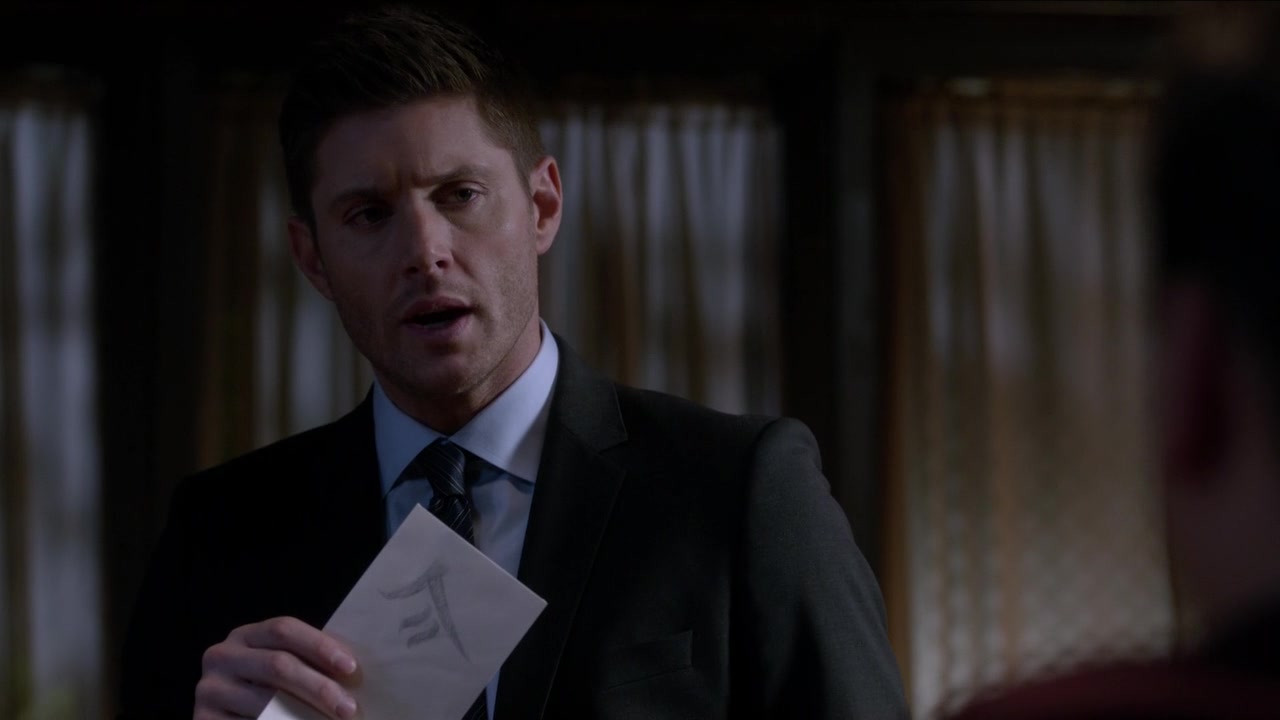
But that’s not what makes Len seem different. The first clue is the distinctive Mark of Cain traced onto a letter in his possession. It is not a common symbol—and it instantly gets Dean’s attention. When pressed for how he got it, Len tells him that Amara was outside the Borden house. Even more, he tells Dean that Amara has done something to him. He admits to Dean, “I don’t know what that girl did to me, but I haven’t been right since. I can’t eat or sleep. I don’t dream. And all the things I used to love, my Lizzie blog, the ghost conventions, they leave me cold—You know, fake it till you make it—or feel it.—I was looking for Amara. I want her to put me back. I’ve always been odd and quirky. But I had a life, friends, and now, I remember how to talk to people, what to say, but I feel like I’m acting, going through the motions.”
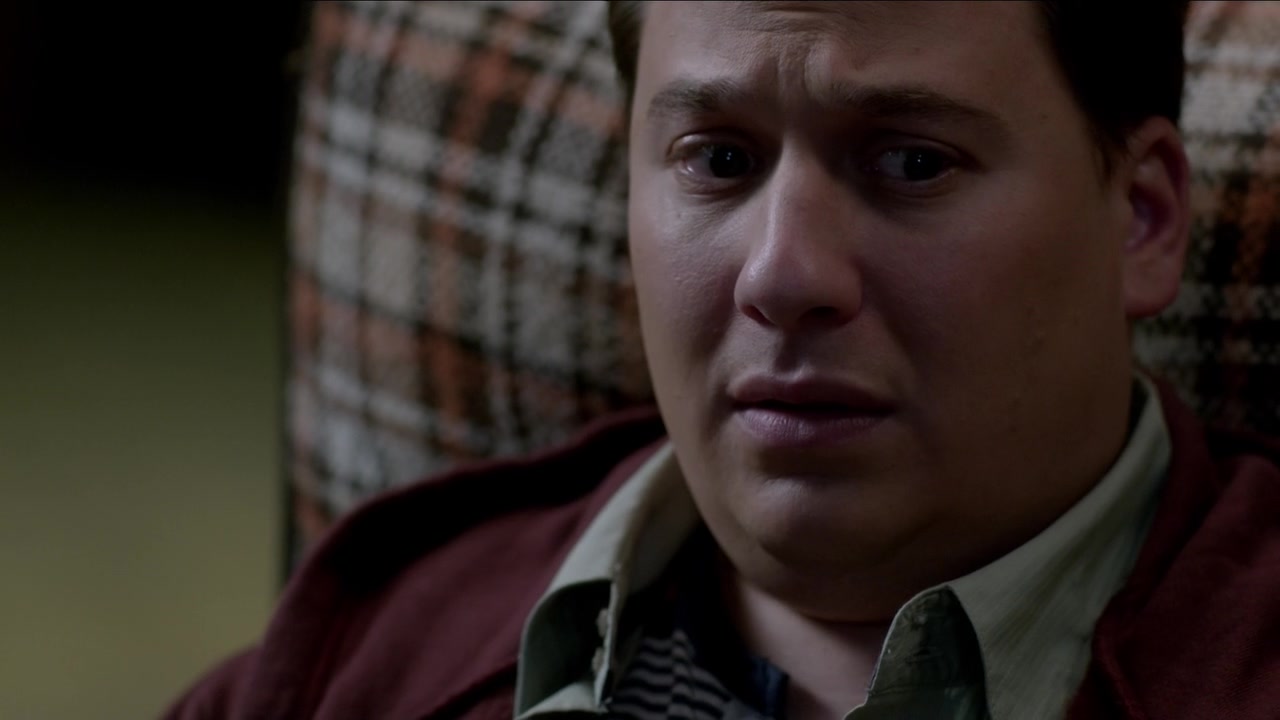
Len has lost his soul. And he’s not the only one. Sam suspects the wife, but instead it turns out to be the baby sitter bent on killing anyone that’s wronged her in any way. She tells the brothers that Amara met her in a parking lot outside a bar—and she made her feel “bliss.” Without the nagging voice of her conscience, Sydney can do whatever she wants and not care about the consequences. All the dreams she had of killing people—such as the Borden House manager or a former boyfriend—can now be achieved. Sydney is finally free.
It is here that we see the two sides of loss come to light. It is here that we see just how Amara is threatening the Natural Order.
In comparing and contrasting Sydney and Len’s reactions to losing their souls, we can see the debate about the Natural Order and its maintenance truly begin.

Sydney finds the experience to be freeing. She wishes to embrace oblivion. Sydney, by being removed from the Natural Order by Amara’s power, feels that she can transcend it. She is able to let go of everything that mattered. Sydney tells the brothers that she was abused by her parents. They burned her and her sister brutally with cigarettes. The scars are a red and angry reminder of their abuse that she can never lose. She tells them, “I used to have to drink myself blind to even look at these let alone show them to anybody. And now, I don’t know what Amara did to me, but it’s just skin.”
Sydney doesn’t have nightmares anymore. She doesn’t have to experience the struggle of dealing with what happened to her. There’s nothing holding her down. In her view, Amara has given her a gift. She states, “No more flashbacks. Amara took away the pain. She lightened something in me.” Sydney seems willing to do anything the Darkness may ask of her—knows that she is free because of her.

And yet, Sydney is an anomaly. Born human with a soul, she is a product of the Natural Order’s construct. Amara may have taken away the soul and all the suffering that comes along with it, but she cannot undo what Sydney truly is: human. She cannot erase Sydney completely from the Natural Order God set up. Sydney is now outside that construct—and yet she’s still very much within its framework. Her thought that she could do whatever she pleased now and not worry about getting caught is precisely what will lead to her death. Sydney cannot simply move around the world—the one beholden to the Natural Order—and be outside its rules and constructs. To do so is to threaten its existence.
The reaction the Natural Order has to that threat is to eliminate it every time. It will find a way to balance itself in some other way—and in so doing it will use another one outside the construct to strike that very balance it seeks: Len.
On the other side of this grief coin is Len himself. While Sydney blisses over what Amara did to her, Len is adrift, lost, and suffering. Amara’s goal—at least as she’s stated it so far—is to replace God’s Natural Order and humanity’s doomed destiny to suffer with something closer to oblivion. In many ways, oblivion is one of humanity’s greatest fears. All of us desire to be remembered, to have our lives matter, to make impact on the grander scheme of the universe, and to live on in some fashion long after our bodies have turned into dust. The thought that the next life is nothingness, is somehow a void, where we go and cease to be is a frightening prospect. In many regards, it is connected to our drive to survive. This drive was seen in Soulless Sam in season six—typically with great violence.
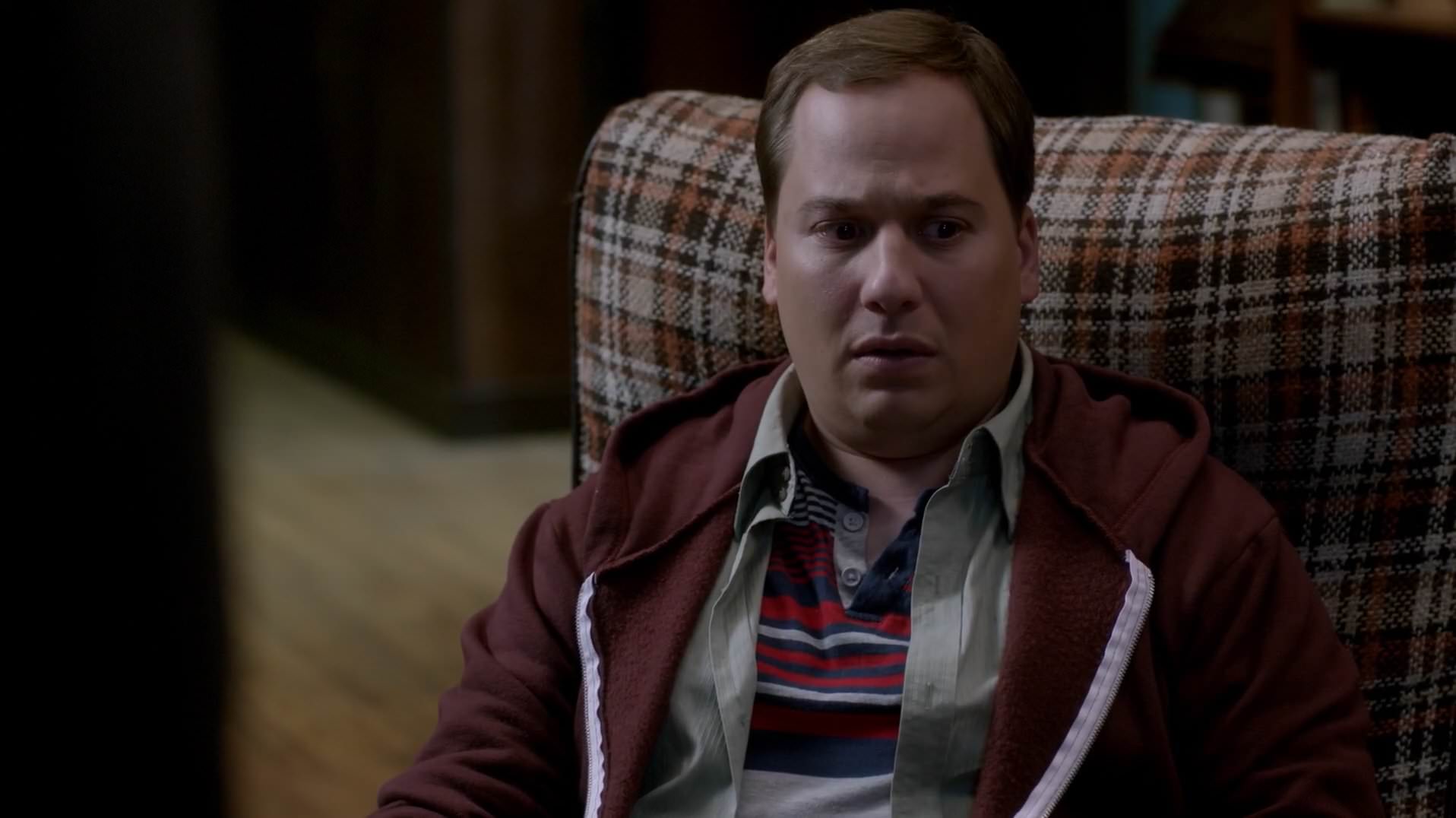
In Len, we see that he is following more of Soulless Sam’s understanding of what it means to lose a soul—without the explosions of grand violence. Len realizes that if he is to make it in the world, he must appear as he always has to the outside world. Knowing that he is now an anomaly, an outsider to the Natural Order surrounding him, Len is facing with crippling suffering. Without his soul, Len is facing the fact that he may end up in oblivion in the long run. He is facing the fact that he himself is a void.
But he also remembers what the rules are. Len knows what is right and what is wrong. He may not feel these things, but he very much wants to adhere to those principles. He wants to go back to the old Len—to be put back into the flow of the Natural Order and be restored within its fabric. Being an outsider makes him feel great loss. While he is unable to feel the way he used to, Len knows what it means to feel. He knows that certain things should freak him out—such as shaking sweaty hands or more gruesomely ripping his own thumb off to get his hand out of the cuffs.
But Len also can feel that this loss is being swallowed by something darker inside. While his soul may be gone and a void has been left in its wake, there seems to be something hatching inside. It may be the duration of his soullessness that has amplified this change over time. He knows that there is only a matter of time before he will succumb, too.
So, after Len kills Sydney to keep her from trying to kill Sam and Dean, he decides he will keep “going through the motions” and turn himself in. He will confess to every crime—and in so doing be locked away where he can’t hurt anyone else. He may not have a soul and he may not really care about anyone else, but he does know what is right.
In this way, the Natural Order keeps Len from becoming a threat as Sydney did. He may not be restored, but he is actively trying to keep the balance in place. In a way, that is precisely what the Natural Order means: balance. Without the sorrow, one cannot recognize joy. Without knowing what is wrong we cannot know right. The good times would not be as sweet if not for the bad times. For each action there is an equal and opposite reaction. These basic principles keep the universe in order and flowing. To disrupt that balance is to create chaos in its wake—and to threaten the entire structure that the universe rests upon.

Amara’s actions truly do disrupt this foundation. With each human soul she eats, she disrupts the universe. So far, these are only minute levels. It leads to two lives being forever changed—Sydney and Len—but in their wake we see more effects ripple out like a stone thrown into a pond. Amara is playing, experimenting, finding the flaws and weaknesses in the Natural Order God has built so she can then disassemble it entirely. She is drawn to those that are dark—her visitation on the Lizzie Borden house comes with its own implications, after all.
Her choosing Len and Sydney, however, show some planning. She truly wanted to see how each person would react differently to the loss she deliberately caused. In Sydney, she found a human that would react with joy at losing the very thing that made her suffer—the thing God had constructed for that purpose. The way she approaches her, calling out “Drunk girl” implies that Amara saw the darker sides of Sydney’s pain and suffering and wondered if perhaps removing the soul would end that. With Len, she saw someone that enjoyed his life, his existence, and what he does. Taking his soul would be another experiment to see if those happy like Len would cease to be happy without the soul.
Piece by piece, Amara has planned to dismantle God’s universe. Starting small allows her to test more and more of its fabric, more and more of its weaknesses, and truly know just where to strike and how hard.
But what about Sam and Dean?

The brothers, the chosen champion of the Natural Order, are now aware that she is going around consuming human souls. They’ve seen both Len and Sydney, seen how it affected each one differently, and now must put together the puzzle Amara is leaving behind. They know that soullnessness is not something to take lightly—after all, in God’s universe, souls are currency. They are everything. It is what makes the various after-lifes go round, it is what makes a human being a human being, and it is how the universe is ultimately balanced.
Not only are Sam and Dean dealing with the chaos left in Amara’s wake, they must also work to reestablish or continue their own natural order. Their work on this case proves that they are finding a way to balance one another, finding that comfort level, and striving to remain on the same page as an equal team. At the start, when Sam broaches the case, Dean is at first reluctant. It’s not that Dean doesn’t want to hunt, he’s just certain that the location of choice will be what it ultimately turns into: a hoax. He easily figures out just why Sam is so eager, and quips, “Wait a minute I know what this is. This has something to do with your freaky fetish for serial killers.”
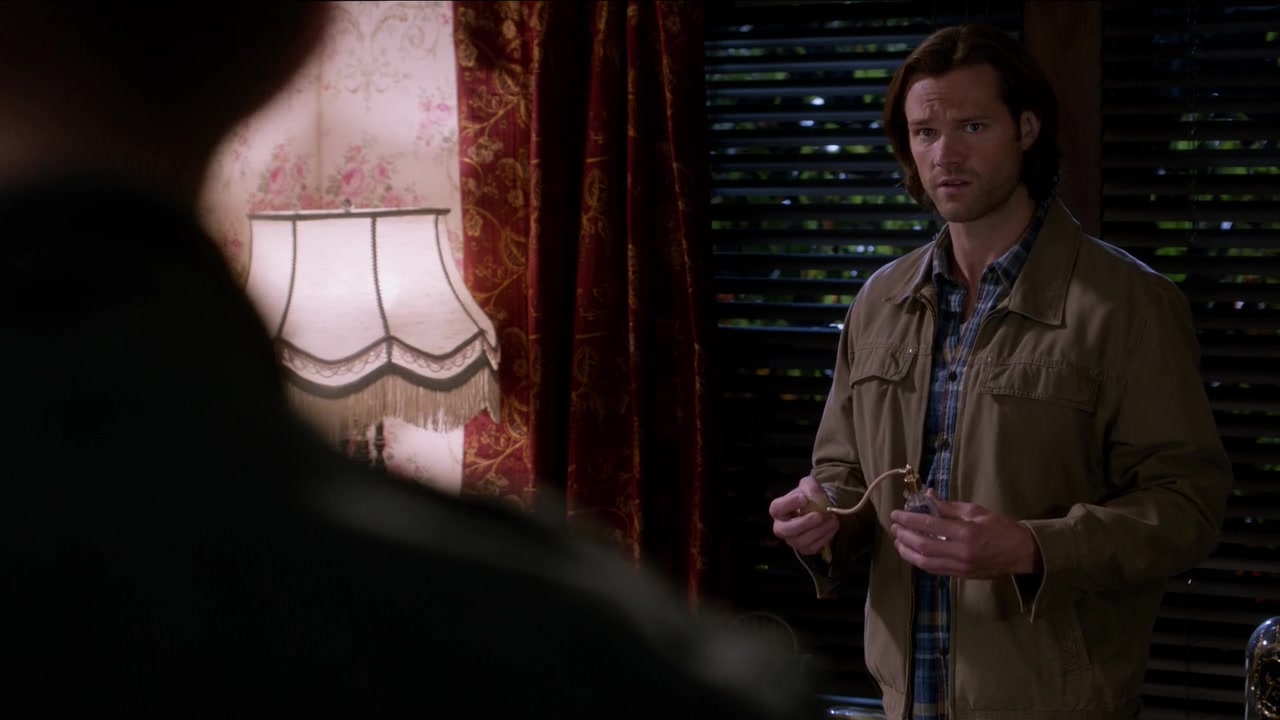
And yet, Sam insists that they at least check it out. Their debunking and early investigation into the Lizzie Borden house also captures just how comfortable and easy it is for the brothers to work together. It is building upon last week’s episode, “Baby,” as the brothers move through the bed and breakfast. Upon seeing Lizzie’s room, both brothers are flabbergasted by the decor. Its floral boldness and quintessential old lady style is perhaps the least appealing thing about it—especially to a Winchester. In a subtle pay back, Sam squeezes the pump on the toilet water, further aggravating Dean. The move exemplifies that these two are indeed brothers and will needle each other just for amusement—giving them a good natured playfulness that will help them work the case as a single unit.
Sam completes his pay back, boyishly quipping, “I just wanted to see if the pump thingy worked.”
The brothers even further the stakes of their brotherly banter by arguing over Lizzie’s room. After all, it only has a single bed. Automatically, Sam argues that because it is Lizzie’s room, he should get it, leaving Dean to find his own.
This type of banter shows that the brothers are comfortable—something that they’ll need to rely on as the case becomes a bit hairier. It also allows them to quickly put to rest any of the “haunting” rumors of the Borden house and allow them to realize just what is really going on in Fall River, Massachusetts.
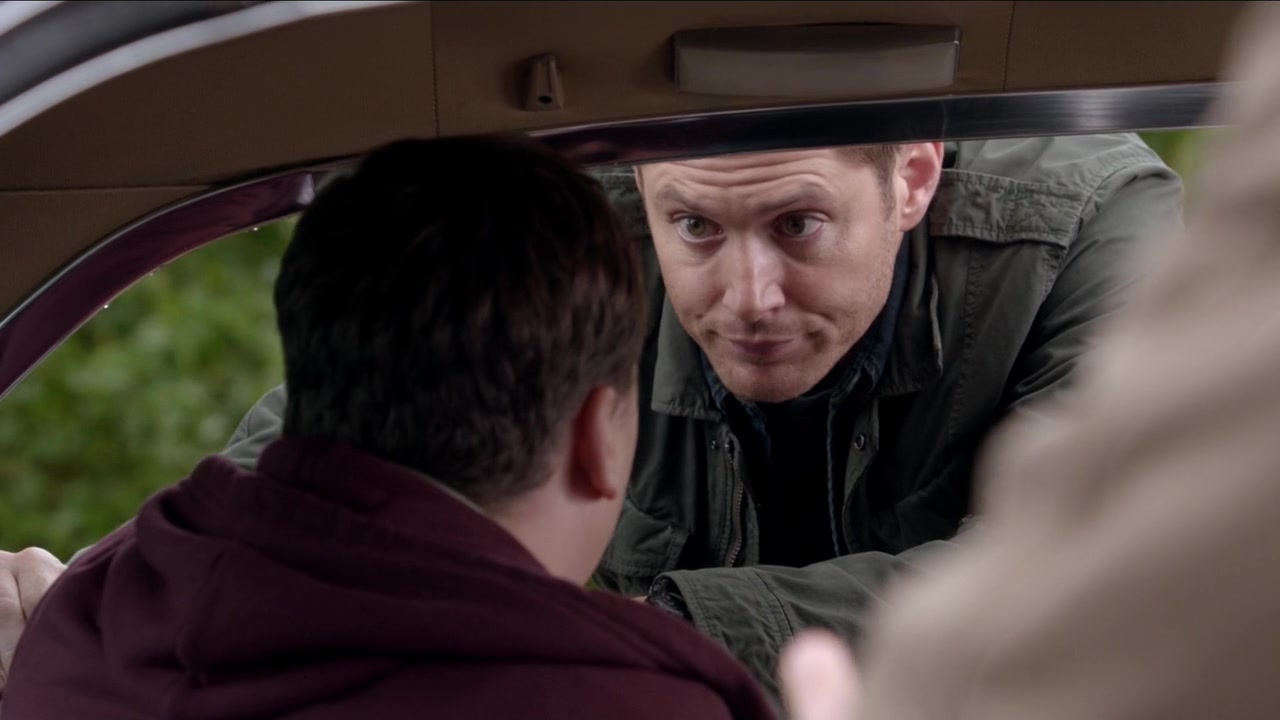
Sam and Dean have to deal with Len’s situation. They realize quickly just what is wrong with Len, but aren’t entirely sure how to tell him. Sam says, “There’s no sensitive way to tell someone their soul has been sucked out by a pissed-off tween.” It’s not exactly an easy thing to deliver—nor are they quite sure how he’ll react. Dean points out to Sam, “It took all of walking down the stairs for Jenna to slit her grandmother’s throat.” What if Len should take this news badly—or allows himself to indulge in violence now that he knows he’s without conscience? Driven to the brink by Len’s endless chatter as he describes just how wrong he feels, Dean finally blurts out just what is wrong with Len. He says bluntly, “You don’t have a soul, alright. Amara sucked it out.”
While Dean may be blunt about this situation, Sam remains sensitive. He remembers what it was like to be soulless, to have that taken away from him, and how wrong it felt, after all. Unlike Sam, though, it is unlikely that Len will ever have his soul restored. He will have to find a way to cope with this loss and to live within the construct of the Natural Order on his own.

Knowing that Len will most likely remain a soulless person for the remainder of his life, however, puts Sam and Dean into a stickier situation. After all, in a sense, Len is no longer human. He’s been rendered an entity, a potential monster in the making, and will likely end up killing people. There may be a time stamp on how long he’s willing to keep “going through the motions.” After all, Soulless Sam had done much the same thing, and at a certain point declared doing so was “exhausting.” Taking Len out now could potentially save other innocent people later on, but killing Len will not help their cause. In a sense, killing Len simply for having the potential to be a killer would make Sam and Dean no better than Amara for what she’s done to him or the others she’s made soulless.
Sam reminds Dean, “Dean we don’t want to kill him. We want to save people, remember?”
It is here that the banter from earlier takes a serious turn. They may have been playful with their teasing of each other when they thought they were working a simple salt and burn, but now they must show a united front to stop Amara and to help those she’s harmed. That means, even though Dean doesn’t like it, adhering to Sam’s new rule—that they’re meant to uphold the “saving people” of their motto. That means saving all the people—even the soulless ones that they encounter. It means seeing them as victims.
Excluding angels, Leviathans, and creatures like Amara, all the monsters they hunt were once human. That means that all of them—mostly—are victims themselves. Something or someone made them into a monster. Someone turned them from being human into something else. For Sam and Dean, it means perhaps expanding their view on “saving people” perhaps. Maybe it’s not just humans they should fight for. It could very well mean fighting for every one that exists within the Dante Natural Order God has created. Each one fits into the system—and those like Len are now outside its matrix and are therefore suffering from that loss.
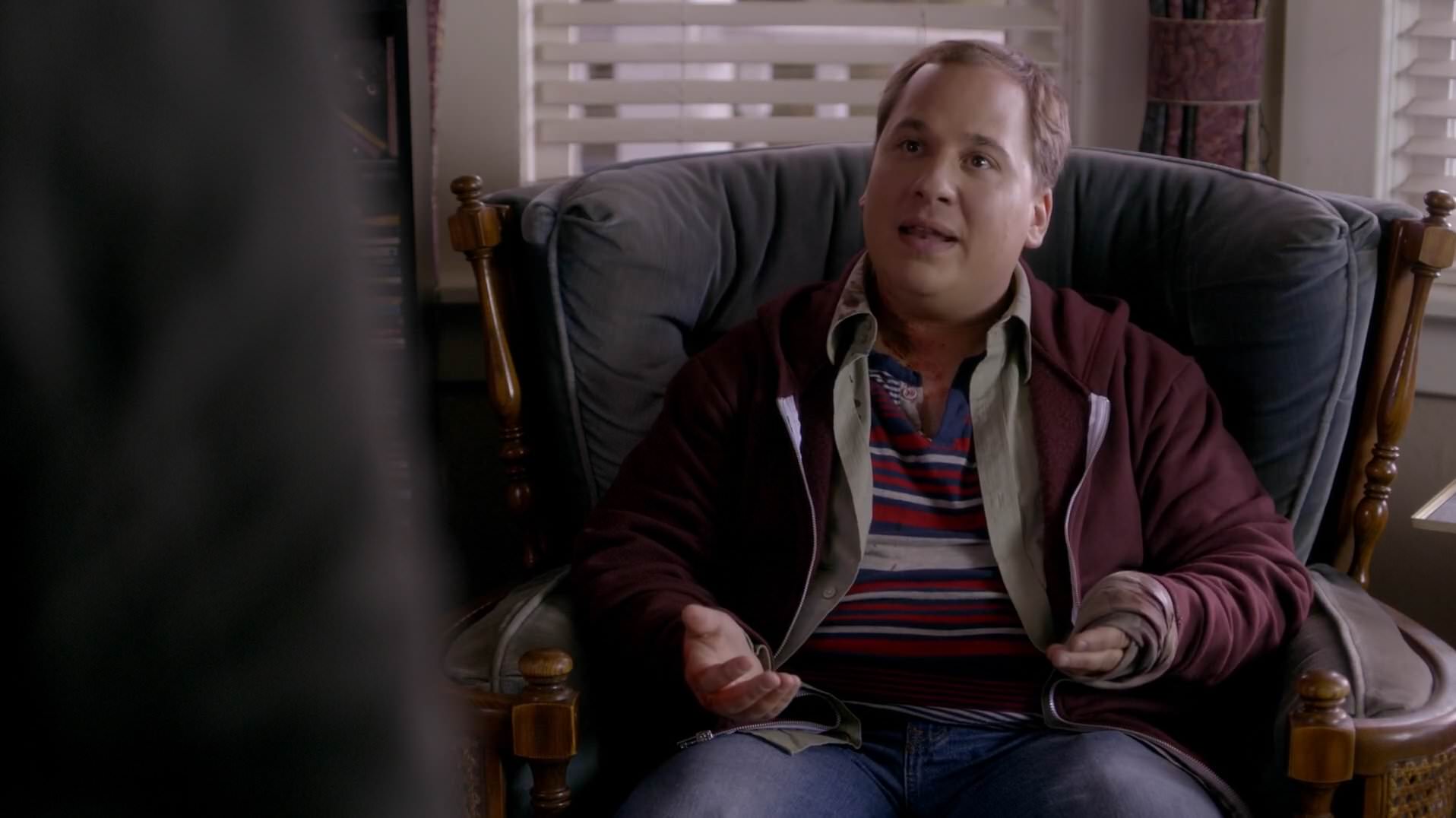
Even more, if someone like Len is willing to fight to remember what is right and wrong, to know how he should act, and commits to “going through the motions,” then the Winchesters have the obligation to save Len if at all possible. He hasn’t done anything yet. He hasn’t killed anyone. Just because he no longer has soul doesn’t mean he has an automatic death sentence placed upon him. What’s happened to him now is a terrible injustice.
To truly help save people, Sam and Dean must stop being the sole judge, jury, and executioner. They must find a way to pardon, to save, and to instill some form of hope into those they encounter. It is the only way for them to truly embody the family slogan. With Len, that is precisely what they attempt to do. They may not trust him—evidenced by handcuffing him to the car door handle—but that doesn’t mean they don’t want to save him.
Even Sydney, despite her violent reaction to becoming soulless, is a victim of what Amara’s done. To counter Amara, to restore the Natural Order to balance, Sam and Dean must try to save them both.
Faced with Sydney’s intentions to kill them both, Sam and Dean struggle against their bonds, keeping her talking for as long as possible. Sadly, it seems they may have to break their new rule of “saving people” in order to stop Sydney from killing them and so many others. Killing her—and anyone else—should only be a last resort. Just as they manage to slip their bonds, however, they discover that Len’s the one wielding the axe, stopping Sydney mid-sentence. In some ways, the brothers can see this as their mistake in not simply killing Len first. In others, however, it is an affirmation that the Natural Order is the only choice—and it is something the brothers must see first hand. Len, being the one that wanted his soul back desperately, kills Sydney, the one that found bliss in losing it. It is a clear rejection, then, of Amara’s plans.
Sam and Dean also take that step closer to restoring their own balance within their partnership and within their own goals. Neither one of them kills anyone in this episode. In not killing anyone, they are truly sticking to the “new rules”—-despite nearly having to take Sydney out themselves. With Len, they’re proving that they are actively trying to save as many as they possibly can.
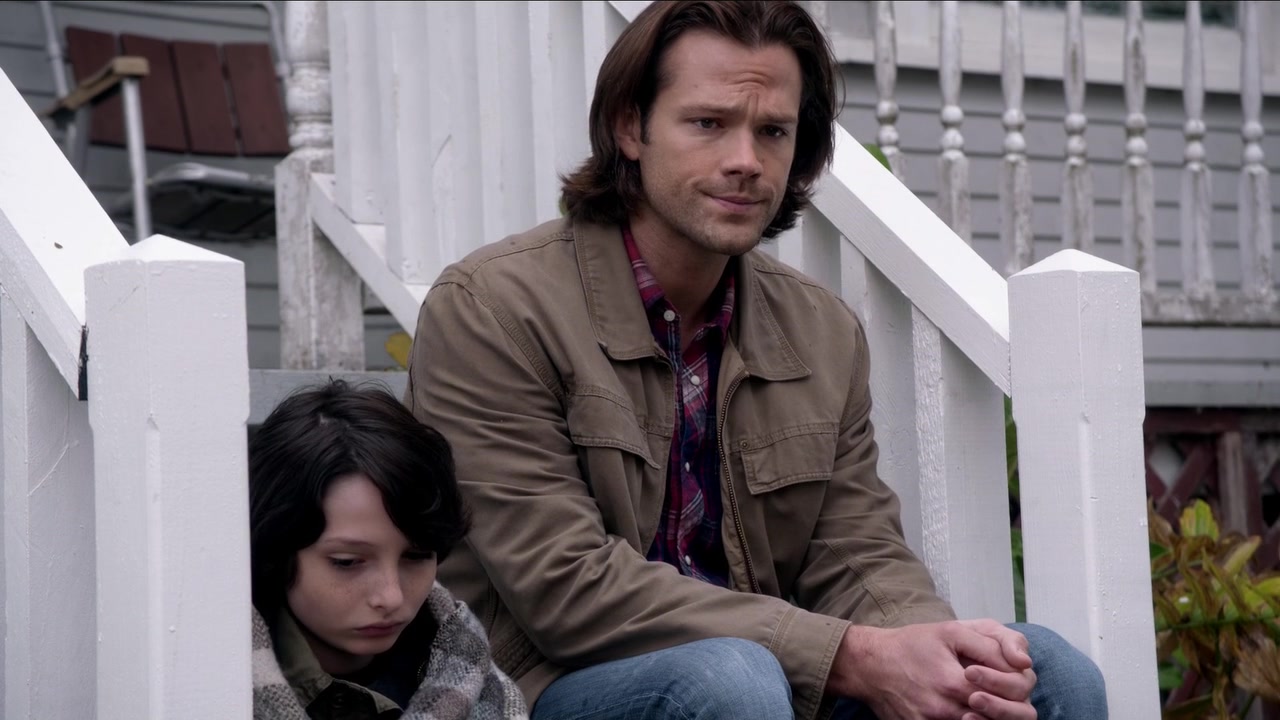
Sam and Dean do more than not kill anyone. They also try and help pick up the pieces for the little boy left behind after Sydney killed his parents. Jordie is the ultimate victim in this case now. An innocent child, he’s now left to figure out where to go next. Sam sits with him on the front porch. He asks if he has anyone he can go to, if Jordie has someone he can stay with. The little boy, still in shock, remains quiet, so Sam tells him about himself. He says, “When I was six months old, my mom died and my dad was never really around much. I realize that’s no where close to what you’ve lost, but you’re going to survive this. People are going to help you.”
It allows Jordie to open up, and perhaps by giving this quiet statement, Sam’s managed to save this young man. It’s another affirmation that their goal is indeed to save others rather than to simply hunt things. It is connecting with the victims left behind that will be their true test of “saving people,” too.
Besides, if Sam and Dean “saving people” doesn’t restore the Natural Order and prove Amara’s path false, perhaps nothing will.



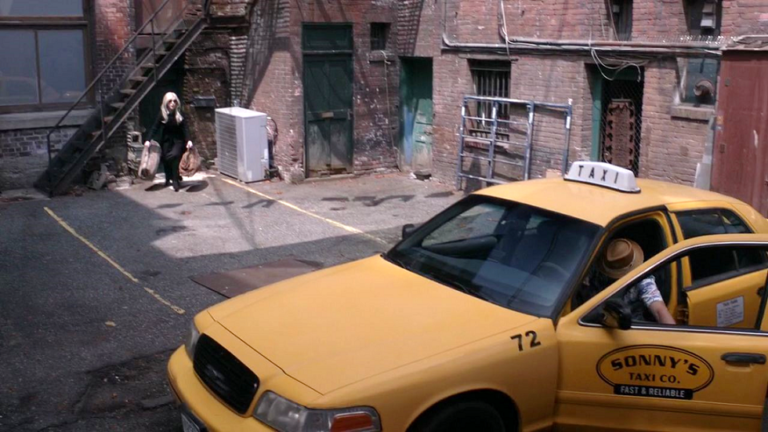
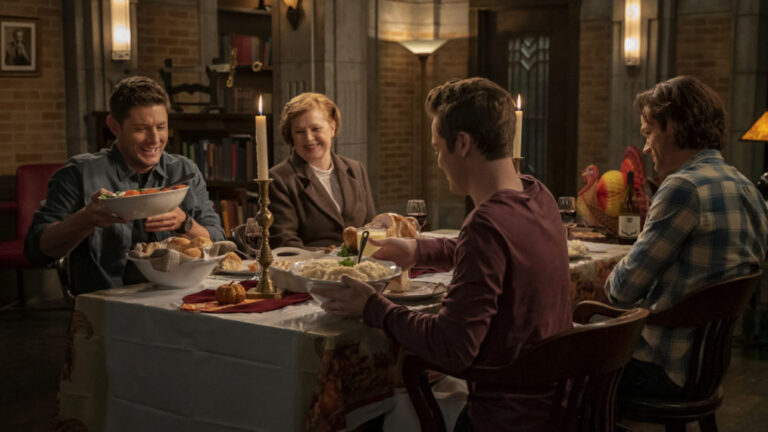
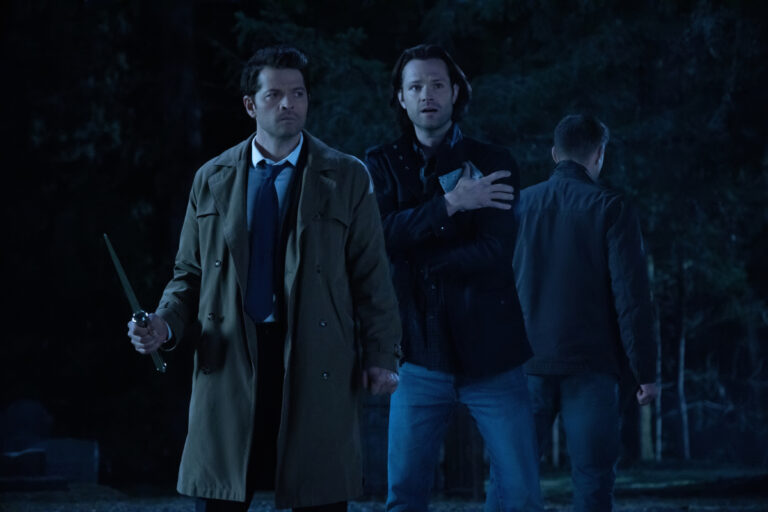
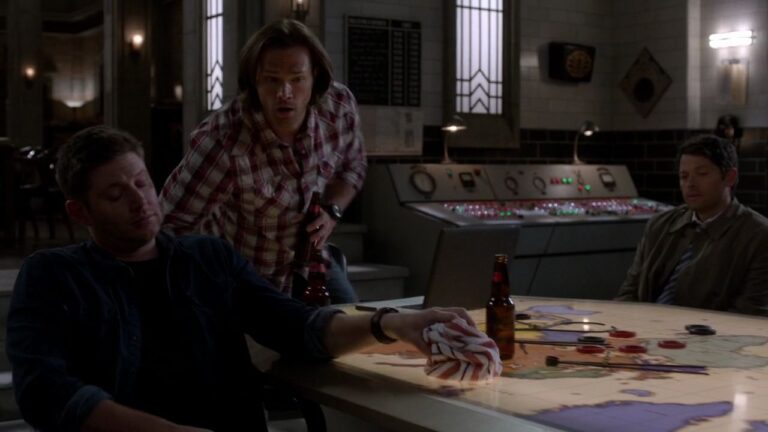


always love reading your analyses….I really love your take on the whole natural order and the importance of saving people in it’s restoration. there’s so much speculating and questions going on right now, it’s making heads swim….I love the pleasant alternate route you take when reviewing an episode….it’s both fascinating and calming at the same time. 😉
looking forward to next week.
thanks again.
Thanks for the comment.
I’m glad you enjoyed my take on this one. It is interesting to see how the balance of the natural order is affected by Amara for sure. I’m glad my analysis can calm you! I just try to understand what the show says to me, and I’m always tickled that anyone wants to read it. I hope you’ll enjoy next week’s as much!
Thanks again.
An excellent analysis of the content of the episode and the underlying ideas of the whole season, in my opinion. Now it is becoming clearer possible Amara’s reasons and what it means that she is not exactly evil, she is just amoral. Her reasons may be the following: people with souls suffer and I free them from suffering and feelings of loss and pain. People will be happy without suffering, they will feel quiet. And what will escape her understanding that suffering and love, pain and happiness are inseparable and can’t exist without each other. That the whole point of human lives is love and suffer, and without those feelings human life is empty. And now I even see the reason why such stance may seem appealing to Dean, if we remember Castiel’s words about Dean in 10.03.
CASTIEL:
Well… I see his point. You know, only humans can feel real joy, but … also such profound pain. This is easier.
Also, it makes sense why is the different reaction to the loss of the soul. Happy people feel the loss and the wrongness and unhappy people feel satisfaction, because it’s easier this way.
And it also makes sense why Soulless!Sam behaved in such a way. On the one hand he had known the profound love and fulfilment from saving people, on the other hand he had also known the profound pain and guilt. That’s why on one hand he felt loss and even wanted to be fixed and went on with his family business, on the other hand he felt satisfaction because the soullessness took away doubts, reflection and guilt.
Thanks for the comment.
Absolutely. I don’t think Amara/the Darkness is entirely evil by any means. She simply doesn’t understand the Natural Order that God has created or what a human life is really about. Sure, she’s studied some things and she’s learned how it’s put together and is working on taking that apart, but she still doesn’t understand what she’s messing with exactly.
As for being soulless being easier, absolutely. I think when we look at Sydney, she found it so much easier to be soulless, to have no conscience, and to stop feeling the profound pain that came with her life. Len most certainly was a happier person who wanted to go back to who he was, feeling the joy that his hobbies gave him. It’s the challenge, I think, for all human beings. It’s finding the balance between good and bad, between happy and sad, and hanging onto the great joy and letting go of the profound sorrow. That’s hard. It’s not meant to be easy to do. In that way, I think it makes sense that people would react so differently.
Thanks again.
I wonder what about that policegirl (forgot her name) from ep2 who killed her grandma? How did she blend in Amara’s plan? Was she unhappy too before the loss? Will we ever know? One more thing… two actually. Firstly, Len has killed, so he didn’t avoid the destination of all who’s lost their souls. The actor was so good, by the way, I’d like to see him again; but imprisonment will hardly save Len, or stop him for that matter. Secondly, if Dean was harsh on Len, Sam was harsher when he told Len that nothing could help him to give his soul back. Sam’s words were planted so deep in Len’s memory that when Dean later tried to encourage him, the boy just repeated, “No, Sam said nothing would help.”
Thanks for the comment.
I don’t know if the deputy felt the same way Sydney did or not. It’s possible, due to the nature of police work and what she saw especially with so many in her town being devastated by the Rabid attacks, that she felt a profound pain that manifested violently when she lost her soul. We may never get the real answer.
As for Len, I count him as a sort of save more than a full save. He did kill Sydney, but he didn’t kill her just because he wanted to nor did he just because he could. I think it’d be interesting to see Len again, see if he can keep to those morals he remembers but doesn’t feel, and if he is able to maybe someday get his soul back. We’re told that he’s probably not going to get it back, but we don’t know and neither do Sam and Dean if that’s the end of the story for him or anyone else like him. I’d like to have hope, but it’s hard to say. I also loved the guest actor. He really made me like Len a lot, and feel reallyd deeply for his situation.
Thanks again.
This season is certainly shaping up to be good, better than S9 and 10.Every episode so far has been great! Well except that stinker of an episode that we shall not name 😀
I don’t think the current Amara actor is that bad. When her face went from happy to annoyed after the angel comment I had to applause that 🙂
Thanks for the comment.
I rather liked the expression Amara had at the “angel” comment, too. She’s sinister in a way that I can’t quite place, and I attribute that this actress so far. She seems like she could turn on a dime from being friendly to cruel without a thought. I’m looking forward to seeing just where they go with the story, too. So far, the puzzle has been intriguing.
Thanks again.
Nice analyze again and the theme of natural order truly fits to the episode and to Amara. If this is truly the endgame of Amara then she really is a danger to every human, angel, demon and monster.
– Lilah
Thanks for the comment.
Yes. Amara is most certainly a danger to everyone. It’s interesting that they’ve already mentioned the monsters preparing to stand against her, even if they feel it’s futile. That shows just how scary this threat is. I’m glad you like how I’m viewing her so far.
Thanks again.
Hi FAE. As usual I greatly enjoyed your take on the episode, and it makes a lot of sense that the D’s endgame is to completely disrupt/destroy the natural order established by God. If that is the case, however, it is quite ironic that the ones seemingly chosen/destined to thwart this attack on the natural order are the very two who have repeatedly been an affront to the natural order. I can’t remember exactly who said it or in which episode, but someone (Death, maybe?) accused the brothers of just that, given all of the times they have cheated death. One or both of them have also been the only humans to have been to Purgatory and Hell and the Cage, and to have both lost their soul and then regained it. I’m sure I’m forgetting a few additional ways in which they have breached the natural order. It actually seems wonderfully fitting that the brothers are the only ones with the capacity to thwart the D, the one being who is very much apart from the natural order. It’s going to be really interesting seeing how this plays out, but for now, your hypothesis is as good as any that I’ve read.
Thanks for the comment.
Oh yes. I noticed that fact about Sam and Dean in “The Bad Seed.” They are the champions of the Natural Order, and yet they’ve been the ones to disrupt it the most. Since they know most about how to fudge the rules and how to break them, they’re the best ones to protect them, too. After all, Sam and Dean are still part of the system. I look forward to seeing how they go about doing so, too. If I’m Amara, I don’t count them out ever, no matter what weird connection she may have with Dean.
Thanks again.
Has Dean lost his soul? I don’t think he has. His soul was corrupted when he was a demon, but he still had it. Sam’s soul has never been corrupted (not entirely, but he came pretty close in season 4….remember that brief flash of black eyes?) but he has lost his soul and then had it restored by Death. And yes, it was Death who told Dean, that the brother’s were an “affront to the natural order.” Despite his seeming annoyed in that moment, I often got the feeling that that is what Death always liked about the brothers. 😀
[quote]Has Dean lost his soul?[/quote]
No, I didn’t mean to state that Dean had lost his soul. I meant that Sam is the only one who has both lost his soul and then had it restored. I was too lazy to specify which events applied to which brother, so it came across differently than I intended. see, THAT’S why I’m generally so long-winded in my posts- I don’t want to have any ambiguities.:D
Also, in what episode did Death make that statement? It was annoying me that I couldn’t recall. I guess it’s time for another series re-watch!
Ummmmmm…….Appointment in Samara maybe? I can’t remember but I distinctly remember Death saying that and I think he was standing in Bobby’s house when he said it.
It was Appointment in Samara. Death was sitting at the table eating a hot dog (with one for Dean). He made that long speech about Dean throwing his life away because he had always expected it to bounce right back. The whole reason for Dean putting on the ring and becoming Death for a day was to teach Dean how messing with the natural order screws up the natural order. A lesson not learned. Sam was chained to the bed in the panic room waiting for Dean to put a bullet in him. But instead he got his mutilated soul shoved back in. Good times!
Thanks Cheryl and E. My memory isn’t what it used to be. And Cheryl, those annual re-watches are paying off!
I wonder if your idea of Amara just wanting to take away pain disrupt the natural order , Would she need to be killed ?? Could she be taught about the Natural Balance / I’m sorry girls but I’m really liking Amara
I wouldn’t like to have no soul because I believe in right and wrong. But the thought of “Ecastasy, Orgasm, Chocolate Cake,” Sounds mighty fine
Thanks for the comment.
That’s a good question. It’s so hard to guess about Amara at this stage—what she wants, what her end game really is, all of it. I’m sure she can be killed—but it won’t be easy. Her comment about not knowing Death and Death not knowing her means she hasn’t encountered that concept until she was introduced to it in her studies (see her announcing gleefully that she killed the nanny).
I like the character of Amara so far precisely because I can’t guess what her ultimate motivation and goal is. It’s nice to know that in a villain/antagonist for the flow of any story, but it’s also sometimes nice to not know for the mystery and the intrigue that it provides. So far, Amara is very intriguing and I wouldn’t mind the thought of that “Ecstasy, Orgasm, Chocolate Cake,” bit, either—just leave my soul, please!
Thanks again.
I agree with you FAE there is much foreshadowing in regard to Amara’s role as a Goddess who is out to re-establish the “natural order” In that regard I also think she is the destructress of family. So far Amara is responsible for the death of mothers and would be mothers. The mother of the baby she became; the Sheriff who was going to mother baby Amara, the Sheriff’s grandma, the mother of the inn keeper, the mother of the boy in this episode and the babysitter who killed the parents of the boy because she thought she could be a better mother. I think she is the mother of all darkness. Of course she does not mind dropping men too- two fathers. Perhaps Crowley wanting to play Daddy to Amara is in for a surprise. I guess since Cas had a pathetic go at it last season it is Crowley’s turn. Sam better watch out too. Dean has called Sam Mom twice so far this season so I suspect Sammy is on Amara’s hit list. I know Amara is supposed to be amoral and seems to take issue with suffering and can spread her heroin bliss but I do not see her as amoral. If the definition of amoral is someone who does not care if his/her actions are right or wrong, or actions that show a lack of care about what is morally right, she does not fit the bill. I think she has her own sense of right and wrong and just wants to, re-arrange God’s creation (the natural order) a bit- her way. The big question in this episode for me was why did Amara take Len’s soul? I know he was the character that juxtaposed the babysitters soul taking reaction but what did taking Len’s soul do for Amara? An experiment? Just because she can? I do not think we were shown why and would be interested to open that question for discussion.
Thanks for the comment.
I think you’re onto something with Amara. I think she most certainly wants to replace the natural order God built with her own construct. As for her being amoral or not being amoral, it’s still so hard to really label her either way for me just yet. On one hand, I see her as amoral because she is very much outside the structure of the current natural order and on the other she is most certainly not because she is fully aware that she is doing things that are wrong and not only doing so but enjoying it. It’s hard to really place a finger on her just yet because she’s so mysterious and we’re not entirely sure just what her end goals really are. I find that incredibly intriguing.
It’s fascinating that most of her kills have been mother figures. It’s a pattern that I hope the brothers notice as they pursue her and try to figure out what to do about her. It may not give them the answer to taking her down, but it may help them in figuring something out about her.
As for her taking Len’s soul, I think Amara either wanted to experiment and see just what would happen to someone like Len—someone happy and content in his human existence—but it is possible that she just wanted to destroy him for the fun of it, too. I think Amara is truly hungry and consuming souls satisfies something in her for a time, but as she’s been portrayed as being empty it’s no wonder she keeps needing more. So it could be a combo of those two things.
Thanks again.